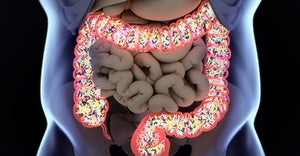Alzheimer's Disease: Type 3 Diabetes?

As if obesity, type-2 diabetes, and metabolic syndrome weren’t enough, evidence indicates we can now add Alzheimer’s disease (AD) to the list of conditions resulting, in part, from a mismatch between our biological makeup and our modern diet and lifestyle. It is no coincidence that we are witnessing a skyrocketing increase in the incidence of AD, which parallels those of the other chronic health issues of our time. Many of these have some of their roots in carbohydrate intolerance—that is, the body’s loss of the ability to properly handle certain amounts or types of carbohydrate foods. In fact, the connections between glucose (carbohydrate), insulin dysregulation and Alzheimer’s disease are so strong that many researchers commonly refer to AD as “type 3 diabetes.”
The blood-brain-barrier is a powerful border that separates the brain from the rest of the body, and carefully regulates the entry of fuels and nutrients into the brain. However, it is not capable of protecting the brain from the negative effects of an onslaught of refined carbohydrates, damaged vegetable oils, and nutritionally empty processed foods. The brain is an intensely energy-hungry organ. Accounting for only about 2% of body weight, the brain uses around 20% of the body’s glucose and oxygen, so anything that impairs its ability to metabolize glucose would have serious consequences for cognitive function, memory, and behavior.
Although the outward manifestations of AD—such as memory loss, confusion, and disturbing behavioral changes—are easy to observe, there are underlying contributing factors at a cellular level which can be measured and quantified. One of the earliest and most significant biochemical changes in the AD brain is a decrease in the rate at which the brain uses glucose, called the cerebral metabolic rate of glucose (CMRglu). PET scans show that AD patients have as much as a 45% reduction in CMRglu compared to healthy people of the same age. Considering the brain’s need for a constant supply of glucose, some researchers see this decline in the brain’s ability to use glucose as the predominant and most profound abnormality in the condition. In fact, AD can be seen as the end result after a significant number of brain cells (neurons) have “starved to death” due to their inability to use their primary fuel source.
Interestingly, the decline in CMRglu can be observed in people at risk for AD (based on family history or genotype) as early as their 30s or 40s, long before overt signs of AD have manifested. Thus, the decreased CMRglu can be seen as a kind of “canary in the coal mine”—an early warning sign that something is going awry in the brain. The extent of the reduction in CMRglu is tied to AD severity. A study that measured CMRglu in people ages 50-80 showed that reduced CMRglu at the time of testing predicted progression from normal cognitive function to AD, with the greatest reductions correlating with the quickest development of full-blown AD. In other words, the lower the brain’s ability to use glucose, the more quickly someone is likely to develop AD, and the more severe the condition is likely to be.
What’s interesting to note is that at the time of testing, even though the younger subjects already had a decreased CMRglu, they were all cognitively normal. This means the brain might be able to compensate for years before damage is so widespread that overt, outward symptoms of AD become obvious. The normal forgetfulness and foibles we associate with “just getting older”—Where did I leave my keys? Don’t I have an appointment somewhere this week?—might be the earliest signs that the brain is struggling to fuel itself.
Considering the connections between Alzheimer’s disease and problems with glucose handling, the term “type 3 diabetes” is quite insightful.
Sources
- de la Monte SM, Wands JR. Alzheimer's disease is type 3 diabetes-evidence reviewed. J Diabetes Sci Technol. 2008 Nov;2(6):1101-13.
- Hoyer S1, Nitsch R, Oesterreich K. Predominant abnormality in cerebral glucose utilization in late-onset dementia of the Alzheimer type: a cross-sectional comparison against advanced late-onset and incipient early-onset cases. J Neural Transm Park Dis Dement Sect. 1991;3(1):1-14.
- Reiman EM et al. Functional brain abnormalities in young adults at genetic risk for late-onset Alzheimer's dementia. Proc Natl Acad Sci U S A. 2004 Jan 6;101(1):284-9.
- Mosconi L et al. Hippocampal hypometabolism predicts cognitive decline from normal aging. Neurobiol Aging. 2008 May;29(5):676-92.
- David Brady







Comments 2
David Brady
Yes the brain can, although it still requires glucose as well, and the coconut oil contains critical medium chain triglycerides (MCTs) for the brain.
Lyn Winters
Can’t the brain adapt to using ketones for fuel and that is why coconut oil is so successful in treating Alzheimer’s?